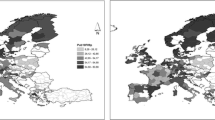Abstract
We examine the drivers of research performance of 1431 economists from six European countries. Data from the Scopus database are collected. We compare the relative performance of economists from three northern European countries: Belgium, Denmark and Germany with three from the south: Greece, Italy and Portugal. Relative performance is measured as the deviation from the country average in both citations and papers. The dependent variables take the value of 1 if the productivity of the researcher is above the country average and 0 if it is below. Probit/logit analysis is employed and marginal effects are estimated to examine the significance of factors like the country of their PhD studies, gender and inbreeding at the national level. A US PhD or a German PhD affects negatively the relative productivity of German economists. Inbreeding at the national level (locally trained economists) reduces productivity among Greek, Italian and Portuguese economists. Gender is significant in the case of Denmark, Germany and Italy, but it does not affect productivity in Belgium, Greece and Portugal.

Similar content being viewed by others
Notes
More on the data and their collection can be found in Katranidis et al. (2017).
A variable that is of interest is also the tenured/no tenured researcher. This is discussed in Oster and Hamermesh (1998) among others. We leave this for future research and would like to thank a referee for raising this point.
The analysis was carried out with deviations from the mean as well as deviations from the median. The results are qualitatively similar and are available upon request.
The analysis was carried out for deviations form the median as well and the results are available upon request.
References
Bauwens L, Mion G, Thisse JF (2011) The resistible decline of European science. Recherches Économiques De Louvain 77(4):5–31
Ben-David D (2010) Ranking Israel’s economists. Scientometrics 82:351–364
Çokgezen M (2006) Publication performance of economists and economics departments in Turkey (1999–2003). Bull Econ Res 58:253–265
Goudard M, Lubrano M (2013) Human capital, social capital and scientific research in Europe: an application of linear hierarchical models. Manch School 81:876–903
Greene WH (2018) Econometric analysis, 8th edn. International edition, Pearson
Guimarães P (2002) The state of Portuguese research in economics: An analysis based on publications in international journals. Port Econ J 1:3–25
Hamermesh DS (2013) Six decades of top economics publishing: who and how? J Econ Lit 51(1):162–172
Hola H, Veloso FM, Grediaga R (2010) Navel gazing: Academic inbreeding and scientific productivity. Manag Sci 56:414–429
Inanc O, Tuncer O (2011) The effect of academic inbreeding on scientific effectiveness. Scientometrics 88:885–898
Kalaitzidakis P, Mamuneas TP, Savvides A, Stengos T (2004) Research spillovers among European and North-American economics departments. Econ Educ Rev 23:191–202
Katranidis S, Panagiotidis T, Zontanos C (2014) An evaluation of the Greek Universities’ economics departments. Bull Econ Res 66(2):173–182
Katranidis S, Panagiotidis T, Zontanos C (2017) Economists, research performance and national inbreeding: north versus south. Econ Notes Rev Bank Finance Monet Econ 46(1):145–163
Lubrano M, Bauwens L, Kirman A, Protopopescu C (2003) Ranking economics departments in Europe: a statistical approach. J Eur Econ Assoc 1:1367–1401
Oster SM, Hamermesh DS (1998) Aging and productivity among economists. Rev Econ Stat 80(1):154–156
Author information
Authors and Affiliations
Corresponding author
Additional information
Publisher's Note
Springer Nature remains neutral with regard to jurisdictional claims in published maps and institutional affiliations.
Rights and permissions
About this article
Cite this article
Katranidis, S., Panagiotidis, T. & Zontanos, K. A note on the relative productivity drivers of economists: a probit/logit approach for six European countries. Econ Change Restruct 55, 2171–2178 (2022). https://doi.org/10.1007/s10644-021-09380-2
Received:
Accepted:
Published:
Issue Date:
DOI: https://doi.org/10.1007/s10644-021-09380-2




